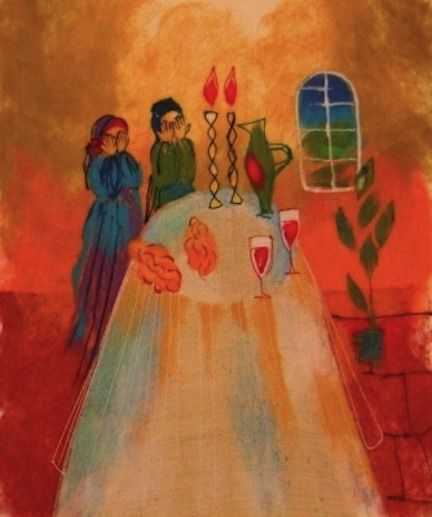
by Phyllis Chesler
Oy, these last two parashiot of Vayikra have given me quite the roller coaster ride, carrying me to divine heights and then down to horrifying depths. We are commanded to not “crush” our brethren (25:46) and, likewise, to not overwork the land—because, after all, we are only sojourners on earth and in a land which belongs to God. We are, at best, temporary trustees, caretakers. How true! And what a redemptive perspective this is. It’s also puzzling because, after seven years, and in the fiftieth year, lands are to be returned to their original family “owners.”
We are commanded not to cheat one another, charge no interest on a loan, take care of those in need—in short, behave ethically, kindly, charitably. And if we do, God promises us rain, copious crops, healthy livestock, fruit-bearing trees, fertility, victory over our enemies, and peace in our time.
But if we violate such commandments—watch out, God will lay us low with fevers, rashes, crop failure, wild animals, sterility, plagues, death via enemy sword, starvation, desolation, exile. Eventually, we will tremble and flee the sound of a “blown leaf as though fleeing from a sword and [we] will fall [when] no one is chasing [us] (26:36).” I am not even going to ask why God threatens such terrifying punishments—what does God know about human nature that we would rather hide beneath a fig leaf?
We are all so poignantly human that we fail God’s every test again and again—and why? Because we are hopelessly tempted by, even enslaved to, lust, pride, greed, laziness, selfishness, gluttony—all the deadly sins.
Enslaved, are we? Well, slavery is allowed here. For the first time, this “peculiar institution” is regulated and limited. Have we learned nothing? Weren’t we all once slaves in Egypt? Don’t we, of all people, understand that slavery is soul-crushing, an abomination? How can the same Torah which commands justice, fairness, freedom, forgiveness, redemption, holiness, also normalize slavery—even if necessary for the survival of an agricultural, subsistence economy? As I mentioned before, these last chapters of Vayikra (Leviticus) take us both to heights and depths.
What do you think?
Here’s to a thoughtful Shabbat Shalom.
- Like
- Digg
- Del
- Tumblr
- VKontakte
- Buffer
- Love This
- Odnoklassniki
- Meneame
- Blogger
- Amazon
- Yahoo Mail
- Gmail
- AOL
- Newsvine
- HackerNews
- Evernote
- MySpace
- Mail.ru
- Viadeo
- Line
- Comments
- Yummly
- SMS
- Viber
- Telegram
- Subscribe
- Skype
- Facebook Messenger
- Kakao
- LiveJournal
- Yammer
- Edgar
- Fintel
- Mix
- Instapaper
- Copy Link







2 Responses
I think one needs to study the writings and explications of thousands of years of scholarship before flippantly commenting on the surface of a sacred text. Chabad.org is a great place to study, with men and women. I just had a discussion with a “not very religious” Catholic who told me the Jewish G-d is stricter than the G-d Jesus talks about ( one and the same) – that “Jews had told her that”- that the “old testament is full of things like splitting a baby in two .”
It’s fine to malign the Torah as you do week after week, year in year out, but please don’t go sobbing about anti-semitism and the Holocaust and the long history of martyrdom of our people after you offer your ignorant superficial fanning of the flames. I would suggest to go online with Rabbi Gordon and come back and beg all your readers’ forgiveness for your evil tongue.
עבדים in the Bible are not slaves in the modern sense. Strict rules compel the master to treat his עבד humanely. He is a ‘slave’ because he has no other way to compensate the person from whom he stole. The Torah tells us that one who acquires a slave acquires a master.